- Home
- Keneally, Thomas
Three Cheers For The Paraclete Page 7
Three Cheers For The Paraclete Read online
Page 7
‘What price solidarity?’ he hissed in Maitland’s ear and placed under Maitland’s nose that morning’s paper, tortured open at the magazine section and folded in two. It was a standard article about the Couraigne prize, salted with precious little headings such as ‘Sacrilegious?’, ‘Fascist?’ and, worse than any, ‘Earn Him Such Hate’. Here were manifestoes by artists who said they’d been misunderstood or worse by Egan and Costello, both of whom were then amply quoted on distasteful art. Finally, Maitland’s statement, spoken to the young man, was set down, and a pernicious sentence began, ‘This, coming from a colleague of Drs Costello and Egan, raises the question of responsibility for the estrangement between established Christianity and the arts. While churchmen squarely blame the arts and the arts squarely blame churchmen, Dr Maitland’s statement is properly self-questioning …’
Costello murmured, ‘You would have no idea how hard it is for Maurice and myself on that bloody committee. We’re not utter fools, you know.’ For some reason his hand went out over Maitland’s shoulder and placed a sugar-bowl with precise anger. ‘What I resent most is the reference to you as a colleague. I will in future consider you as a colleague only when it cannot be avoided.’
Then he began what was intended to be a march with intent, a march that would be a withdrawal of any brother-feeling from Maitland, and would be remembered by the students when the story of Maitland’s treachery became known to them. He took the first step and then almost fell. Maitland’s hand, concealed beneath table level, had him by the skirts of his soutane.
‘Listen to me,’ Maitland told him so loudly that Nolan gave up his bogus enthrallment in the reading and glowered down the table, crooked horns of light from the windows taking the forefront of his head, making of him a prim and institutional Moses. ‘I didn’t know that slimy boy was a journalist. I’m not that much of an utter fool either.’
‘Are you going to let go of me?’ Costello roared.
Nolan, his cheeks blue with reproach, had no choice then but to ring the bell before him and put an end to the reading so that Costello’s high temper could be drowned out by conversation.
‘I’m sorry,’ Maitland said, and handed back the newspaper. ‘But I didn’t know.’
Costello marched out, more or less as planned. He had become very large and even more barrel-chested with anger.
At the top table, Maitland had stood up and was edging behind Nolan’s chair to speak with Egan. The little priest received the explanations at worst judicially and at best sunnily. He said, ‘But you have to be particularly careful with strangers, James. You have no idea of the number of people on and off the panel who consider it fair sport to prey on Dr Costello and me. It worries Dr Costello.’
Yet it didn’t seem to find Dr Egan home at all. Propriety alone seemed to motivate him towards the grave or genial acceptances he kept giving to Maitland’s story. He was impatient for Maitland to finish, and closed the topic with one sentence: ‘Just let me warn you, James. Suspect any stranger who so much as mentions the Couraigne prize to you.’ This said not nearly so urgently as the words themselves demanded.
Then Egan lowered his voice, his eyes wavered in such a way that he could have been a travelling salesman telling about the farmer’s daughter.
‘Did you notice? More letters about the Quinlan book. And a review in the book section. Pity you can’t join the fray.’
‘I wish I could,’ Maitland lied, beginning to see that his friend was an anomalous sort of man. Egan was concerned with blasphemous art and radical opinion in the way that an idle woman is interested in her neighbour’s sins, but honesty and lassitude both kept him from taking the shrew’s overly moral tone. It was possible to believe, comparing Costello’s wrath and Egan’s unsurprise, that Egan was the one who might well be frying bigger fish of unknown and unexpected species.
Maitland kept to the point of his betrayal. ‘I don’t want to offer this as an excuse for being a Judas, but I was in an anti-clerical mood, having just finished an argument with the monsignor.’
Egan’s boyish hand raided a silver dish of marmalade. There was no doubt he was feeling well today.
‘That’s funny,’ he said. ‘You think of yourself as less of a priest than he is, and so you think that a word against the priesthood is a word against him.’ He went out of his way, by grinning, to imply that this reflection was curious, not moral. ‘Don’t let the monsignor give you a sacerdotal inferiority complex.’ He made a gesture of amplitude with his bread-and-butter knife. ‘It’s everyone’s eternal priesthood,’ he said. ‘You surely can’t have anything more eternal than eternal.’
‘Even the way that man does his hair reminds me of the everlasting hills. Never mind.’
‘You mentioned an argument, James.’
‘Yes. Over my sermon. I’m rostered to preach at the cathedral tomorrow. The president wanted to censor my sermon.’
‘The cheek!’ Egan beat the table with his furled serviette. ‘I’ve never heard of such hide. As if anyone can hear what you say in there anyhow. It’s for all the world like one of those old-fashioned railway terminals. It isn’t exactly Wittenberg Cathedral in 1517, is it?’
‘I hope to heaven not.’
His breakfast eaten, his students’ breakfasts eaten, Nolan remained, not willing to ring the bell, aware that Maitland was at work on explanations and not wanting to break their rhythm in case there were any for him. So in the end Maitland came and stood by the back of his seignorial chair spired like a cathedral.
Nolan said, hearing Maitland’s defence, ‘I realize, of course, that the newspaper came accidentally by what you said. I never imputed malice to you, James.’
Maitland knew that he was meant to say, ‘Thank you.’ He discharged that duty.
‘The trouble is that you only speak with any confidence to outsiders. Externs.’
Maitland flinched at the narrow word he had not heard since student years.
‘I’m not under suspicion from them, monsignor.’
‘Yes you are. The whole world fails to understand the priest and therefore suspects him. One who pretends to be of them, like them, they simply despise.’
‘I see,’ said Maitland, attempting to skirt irony. ‘Might I assure you that my sermon of tomorrow will be so much like this House, of this House, that no one need hang his head?’
Nolan chose to make a small gratified noise and reached for the hand-bell.
‘That’s very wise, James,’ he said. ‘Anyhow, it’s hardly worth saying anything revolutionary in there; it’s an awful place for sound.’ He even brought his left hand across to pat Maitland once on the wrist. ‘If you’re bent on becoming a famous heretic, James, I’d like to see you begin your career to more effect than that.’
Perhaps this warmth was merely a face-saver for Nolan, who was not, after all, going to see a draft of the sermon. Yet Maitland found it peculiarly welcome, like the one card – and that from a business firm – that the lonely get at Christmas. Upstairs, he soon forgot the raw blue sea and the Saturday sun now making a short incursion across the balcony he never used. The drumming-up of a sermon to fit the peculiar needs of that Sunday engrossed him. He began by accepting Egan’s and Nolan’s tenet that a cathedral sermon could do nothing for the commonalty of man. Therefore it must do something for the man who spoke it. It must be both honest enough to allow him to keep his self-respect, specious enough to woo the respect of the Nolans and Costellos. And, Il faut intéresser, as Flaubert says.
So well did he enjoy working by these imperfect or even indecent standards that he spent the whole day on the exercise, forgot his dinner, and postponed all morning turning on the heater in a room where the cold hung like wet clothes from April to September.
Years before, he had written an article comparing the religious perceptions of a number of modern novelists with those of some of the mystics. He had meant to point to the meeting-place between humanism and religion. This morning he decided to make this the basis of his sermo
n, accepting the immense young man’s abstractions involved without too much discomfort. It would all go down very well after his Friday-night treachery.
So he dipped all day in broken-backed Penguins, in St John of the Cross, Tauler, Teresa of Avila, Blaise Pascal. He allowed himself, without any cringing at all, to write such sentences as, ‘However doctrinally misled the great Frenchman Blaise Pascal may have been …’ As if he valued anathemas more than the vision of God.
Altogether, he had a day’s good reading and easy writing.
There is something unique and even narcotic about the way of Gothic with light; even of neo-Gothic; even of the bad neo-Gothic of St Kevin’s Cathedral as Maitland came forward to preach. Over the Celtic mosaic of the sanctuary floor lay a sharp pattern of light, gold streaked with the red refraction of the wounds of the martyrs in the rose-window, gold blotted with the blue virtue of Virgins and the dappled authority of Evangelists. From the brow of the pulpit, the illimitable nave looked like a steppe, and the clusters of worshippers were scattered over it as if symbolic of towns on a great plain.
All this made it somehow appropriate that he should shuffle his manuscript lightly like a born Rosary Crusade preacher and fix the people with the eye of a priest who is onto their pettinesses and evasions. Twenty feet up, he did all this not merely because no one could see the nuances of his eye and hand, but as revenge on a building and a sermon (his own) which were almost not spurious.
None the less, he was an orator. He felt very professional with knee-length stole round his neck, and the insipid innocence of what he said so well lay warm beneath the heart. As well, his thorough-going cynicism was in the nature of a busman’s holiday for him. He glanced towards the north transept where sunlight and two late-comers stood in the doorway. Beyond them was the cathedral presbytery within which the archbishop sat with his ear to a radio broadcast of the sermon being preached fifty yards away.
Maitland closed vigorously, switched off the microphone, and went away into the sacristy. He doffed the surplice and stole at the long vesting bench and found the lavatory near the outer door. This was of hewn rock, with a cedar door, a lion’s-snout door handle, and a bowl too fragile, you would think, to carry a Costello. Skinny Maitland, however, was well within its strength.
He was still there when someone came in through the outer door and could be heard pacing the sacristy. Maitland bet himself odds-on that it was a comforted prelate. Thinking it unworthy of the occasion to activate the crude cistern, he washed and emerged to find His Grace leaning on the vesting bench and fondling a red biretta.
‘James, I must congratulate you. Very scholarly, very powerful, and couldn’t have come at a better time … What? Don’t worry about that, we all have our day of grief with the press. They’re as pervasive as the grace of God. However, this surely makes amends. Just when this whole Couraigne business has broken again, as it does most years, and then the dispute over that infamous Quinlan book going so badly, nothing could do more good for our prestige than the style of sermon you’ve just preached.’
For more than one reason, Maitland bowed his head.
On the way to the ferry, he passed through the Botanic Gardens and was forced to confront the honest face of Sunday – lovers under a magnolia-tree, children throwing crusts to the ducks, a Calabrian family dressed in Calabrian best negotiating the alien picnic places. By the trite alchemy of such things he stood convinced that his jaunt in the pulpit that morning had been the worst mummery of which he had ever been guilty. A man of excess when it came to guilt, he stopped in a walk of tropical palms, beside a prosy statue of George V. He accused himself of being as inapposite to man as was the florid monarch to his avenue of palm-trees. This small melodrama of shame over, he continued on down to the wharf.
But, trying to come to some sense of the Other, all he could find was his own small, sharp vacancy, not unlike the heart of a municipal gesture, the grey craw of a king done in bronze.
Until dinner-time, he hid in the library of the House of Studies; and it was not until he got to table, until soup had been taken and the Martyrology read, that the unwelcome applause of the monsignor and Costello’s forgiveness descended on him. Never, even as an Ishmael, had he felt so abandoned at that large joke of a dinner-table.
7
‘ARE YOU UNEASY?’ the genial Costello asked. ‘I mean, after our last drive together.’
He could not have expected the truth; for though he sped downhill at sixty and more, he at the same time jabbed all the buttons on his new car and carefully made Maitland welcome to all its fingertip amenities.
Outside, it was night and the beginning of winter. The beachfront could have been the victim of an atmospheric tragedy, the pubs and cafés standing lit and empty, offering absurd summer promises to the unpeopled promenades. Yet Maitland, however uneasy, felt gay; and for two excellent reasons. He had been called, at ten minutes’ notice and an awkward hour, to the cathedral presbytery, the same way that Costello, Nolan, Egan, and other priests of consequence were called. Secondly, he and Costello chatted like the colleagues Costello had claimed, a week before, they would never be.
‘Uneasy?’ Maitland said. ‘No. I’m lucky to be driven.’
‘Don’t mention it. I have to chair a meeting in the city anyhow.’
Costello, certainly, was dressed for chairing – tailor-made clericals, regal face, and dark mane flawlessly barbered. Maitland himself had shaven quickly and missed square inches of stubble, and had no time to more than rub his new shoes which were his best point. It was possible for both men to pretend virtue on account of their habits of dress; but there would be nothing of virtue in it until, for the sake of the vision of God, the slovenly man came to groom himself and the kingly man let his beard grow wild.
‘Perhaps I shouldn’t tell you,’ Costello said, ‘but … well, do you like policemen?’
‘Never had any reason not to.’
‘Well, the chaplaincy of the guild of policemen is vacant. A real plum. You’ll have traffic policemen under your thumb, which is the only place to have them.’
‘Why the breathless night journey if all he wants to do is appoint me chaplain?’ Knowing the answer, the young priest asked the question in celebration.
‘Breathless night journeys are one of His Grace’s specialities. You’re lucky he didn’t summon you at one in the morning. It’s happened, you know. It’s all a matter of when he happens to remember things. Of course, I’m only guessing about the gendarmes.’
Costello slowed, but decided not to stop at a halt sign. ‘Let not mere traffic laws hold us back,’ he sang, ‘when our prelate summons.’
Maitland hardly heard, being busy with exorbitant hopes of what Nolan would call ‘settling to the life’.
Towards the end of the journey they began to speak about books. Costello’s Praelectiones was due to be published within weeks, and Maitland was known to have sent his thesis off to the publishers the week before. There the comparisons ended. Costello’s work would appear in four dowdy volumes of Latin, pages uncut. Italian publishers let a book on the sacred sciences stand between grey endpapers and on its merits. Yet it was unlikely that a man used to Anglo-Saxon, cut-throat methods of book production, and proud of his heater-demister, would allow his books to appear between cartridge-paper covers. Maitland had heard that, at Costello’s own expense, covers featuring Pius IX speaking with some of the Fathers of the first Vatican Council had been printed locally and shipped to Rome.
Maitland’s own book, jollied up by the publishers to look like prime reading, welts of abstract red and blue and yellow streaking the engraving he had suggested for the cover, would find its way in small numbers into popular bookshops and be bought by random people who probably had little use for it. In fact, Costello’s book and his own would reach about the same number of people, one coming with honour into the libraries of monasteries and houses of study, his own outsold and outdisplayed in bookshops of high-or middle-brow.
In any ca
se, the book talk dear to the hearts of all authors occupied them as far as the city. In time they saw the cathedral rise beneath low cloud and in a remarkable wash of reflected light from the neons and pleasure palaces – strip-tease, discotheque – half a mile farther on.
Costello let him out in the presbytery yard. Maitland found the porch and the electric bell. In stained glass above the panelled door, one word, Sapientia, shone dimly like an advertisement for an Edwardian soap. He did not ring a second time, although he was left unanswered for half a minute. At last one of His Grace’s secretaries swung back the door. The hall was revealed, lit with acanthus-leaf light-fittings and hung with religious art, all of the Couraigne school. The secretary shook Maitland’s hand and brought him past a number of parlours to a room which, large as it was, seemed nearly all oaken table and seignorial chairs. Besides these, the room accommodated a fireplace set with haunches of hardwood and burning on a large scale, four chinoiserie book-cabinets, a prosperous layman, and His Grace.
Maitland knelt to kiss the prelate’s ring – one of those Oriental tests of submission a man should perform without thinking too well of himself.
James,’ His Grace muttered as Maitland rose. ‘Dr Maitland,’ he said more loudly then, and indicated the layman. ‘Meet Mr Des Boyle.’
Both Maitland and the layman considered shaking hands across the table, but its width defeated them.
‘Des is the president of the Knights of Saint Patrick,’ His Grace was happy to say, ‘and a chartered accountant of the first rank. Sit down, James.’
Both subjects, however, waited to sit until the archbishop had outflanked them and taken the chair at the head of the table.
‘Winter beginning to close in, Dr Maitland,’ Boyle said and raised a face, now forty years old, which Maitland had seen as a boy by two’s and three’s in nearly every class at R——— Street Christian Brothers’ – head long and plump, hair breaking in a straight mound from a high forehead, nose bulbous, skin firm and tending to shine. One of the prides of Erin. Such faces led classes, played in the forwards, were head altar-boys at Corpus Christi, and habitually won scholarships.

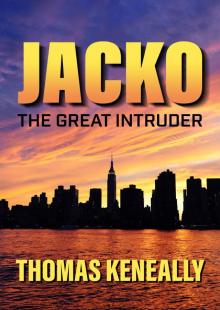 Jacko
Jacko Flying Hero Class
Flying Hero Class The Chant Of Jimmie Blacksmith
The Chant Of Jimmie Blacksmith Three Cheers For The Paraclete
Three Cheers For The Paraclete The Widow & Her Hero
The Widow & Her Hero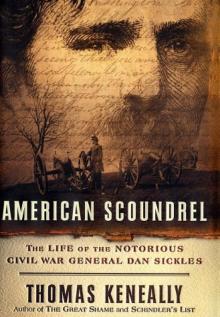 American Scoundrel
American Scoundrel The People's Train
The People's Train A Family Madness
A Family Madness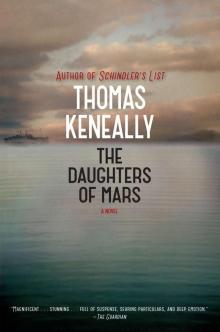 The Daughters of Mars: A Novel
The Daughters of Mars: A Novel Homebush Boy
Homebush Boy Bettany's Book
Bettany's Book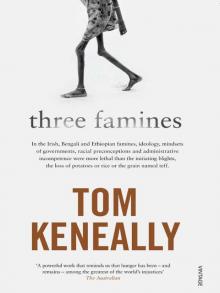 Three Famines
Three Famines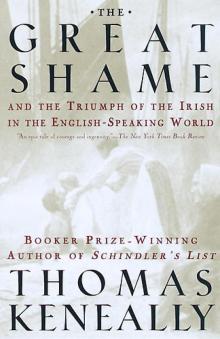 The Great Shame
The Great Shame